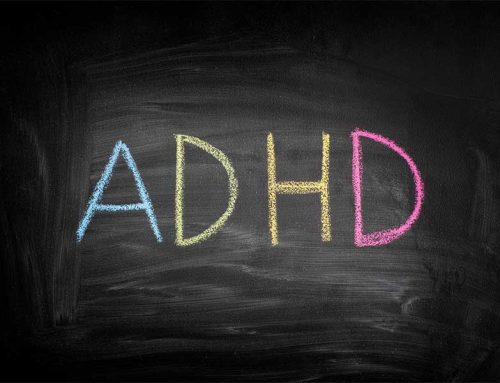One of the persistent and unhelpful myths around ADHD is that it is a disorder of young males. There are clear differences in the rates of diagnosis of ADHD between males and females in childhood, with as many as nine males diagnosed for every female. In adults however, ADHD is found at almost equal rates in each sex. In adult-diagnosed ADHD, females tend to be older than males when diagnosis is made.
There are several reasons for the seemingly higher rates of ADHD in male children, including males being more likely to externalise their symptoms and exhibit overt behaviours, whereas females are generally better at developing coping strategies and ‘masking’, or hiding, their symptoms. Girls also tend to be less hyperactive and internalise their ADHD symptoms, and so get noticed less. Missed diagnosis of ADHD in females may occur when co-existing anxiety or depression is present as several symptoms of ADHD may mistakenly be attributed to that coexisting condition.
ADHD in adult women
The coping strategies that often lead to missed diagnoses as young females can start to fail however as they grow and start to face life’s challenges, such as university, employment and relationships. In addition, there are issues unique to females related to the effects of sex hormones on ADHD symptoms and response to treatment. The normal monthly changes in hormone levels, and major hormonal changes such as puberty, pregnancy, perimenopause and menopause can significantly impact ADHD symptoms.
The reason for this is that oestrogen, the primary female sex hormone, regulates the levels of the brain chemicals such as dopamine which do not work as effectively in ADHD. Clinical research has shown that attention and ‘executive thinking skills’, such as planning and working memory, can improve when oestrogen levels are higher but that ADHD symptoms can worsen when oestrogen levels are lower.
Around perimenopause and menopause, when oestrogen levels change significantly, symptoms like ‘memory fog’ and difficulty focusing occur, which can be even more difficult for women with ADHD.
Managing ADHD and hormonal changes
There are practical steps which can help women who have to deal with the dual challenge of menopause and ADHD symptoms. These include:
- Keeping a symptom diary to track your symptoms on a daily basis.
- Speaking to your GP about whether you need a referral for an assessment for ADHD.
- Discussing your hormonal changes with your GP. There are blood tests which can help identify if you are either perimenopausal or menopausal. It might be recommended that you have access to hormone replacement therapy (HRT) if appropriate.
- Leading a healthy lifestyle, including getting regular exercise and eating a healthy diet
- Learning more about both ADHD and menopause, and how they affect your everyday life (known as psychoeducation)
How treatment can help
ADHD can be effectively treated once diagnosed, through medication and/or psychotherapy. Treatment of ADHD with medication can improve the symptoms which both ADHD and menopause share, and have a positive impact on everyday tasks. Equally, where appropriate, accessing HRT to help stabilise hormonal levels can help out with some of the shared symptoms of menopause and ADHD.
The relationship between hormones, ADHD symptoms and stimulant medication commonly used to treat ADHD can be complex, and there is evidence that the stimulant medications used to treat ADHD, such as Vyvanse, actually improve executive functioning in healthy menopausal women, and that the latter, as shown by neuroimaging, activates executive brain networks. These findings suggest that some women may benefit from ADHD medication to treat cognitive impairments during menopause. on functioning during key times of hormonal change
If you already have a diagnosis of ADHD and find that hormonal changes impact how your medication works, talk to your doctor, as changes to dose or even type of ADHD medication can be offered, as well as psychotherapy if needed.
This article was edited on 24/1/2023.






Fantastic information. Is so helpful to read a text that brings inforamtion I coud not think of, such as menopause and ADHD – which is my case. Knowledge together with medicine can work very well. Thanks!
Hi Maria – It is always really gratifying to know that our blog articles have been helpful. We know that so many women are struggling with ADHD, and we are working to make more information available on this topic. We will shortly be launching a Resources page on our website, and this is a topic that we will definitely be visiting.
Interesting article, thank you. I am slightly confused by Strattera being described as stimulant medication, though, as the active ingredient Atomoxetine is a non-stimulant as far as I know.
Hi Taria – Thank you for getting in touch. This was an error in editing and the article has been updated. Atomoxetine is indeed a non-stimulant and we are grateful that you spotted this.
I’m interested to know what is known about how HRT impacts the efficacy of stimulant medications, and vice versa. Has anyone done any studies yet on this? I would like to know if it is just Oestrogen or if Progesterone and Testosterone have impacts on medication and vice versa?
Hi Rachael – This is a great question. Whilst there is very little or no research into the effects of HRT on ADHD symptoms, individually there is limited evidence that Oestrogen can decrease ADHD symptoms (in some) and Progesterone and Testosterone can increase symptoms of ADHD (in some). However, more research is needed to clarify this.
Ended up here while looking for answers to exactly the question of HRT as (temporary) off-label treatment for ADHD symptoms. As there’s a wait list for ADHD assessment and thus medication where I am, I’m hoping my GP will agree to give me HRT for cognitive symptoms even though I have no need for it for any other reason (luckily). Some sort of renewed bleeding/spotting seems a small price to pay to get some of my EF back if that is an option.
After menopause, you’d normally take HRT continuously so no bleeding. I’m an HRT user.
Very interesting, there is just one sentence which I find a bit confusing: “…and there is evidence that the stimulant medications used to treat ADHD, such as Vyvanse or Strattera actually improve…”.
As far as I know Strattera is NOT stimulant medication.
Hi Dina – Thank you for getting in touch. This was an error in editing and the article has been updated. Strattera is indeed a non-stimulant and we are grateful that you spotted this.
Yes, I agree we have our issues, until we come to the point where we can discuss these issues we will continue to suffer in silence. This is something I am no longer prepared to do, women have issues that are unique to men with one thing in common we are women with different needs – we have to start to embrace ourselves as women irrespective of ADHD. Very enlightening and encouraging to read. Like Knowledge and medicine can work well.
Very encouraging. I find myself in this position now – just receive adhd diagnosis at age 44 as I head towards peri M.
I’m in the exact same place. Ended up paying privately for an assessment- insane nhs waiting list and confirmed combined type ADHD. Just diagnosed, 44 and my periods have started coming earlier, flow is erratic sometimes 2, sometimes 6 days and night sweats a few times a week. My psychiatrist actually recommended starting HRT. I’ve got an appointment with GP to discuss. Glad we both finally got a diagnosis and I wish you luck.
Very interesting article. I am 49 and diagnosed with ADHD. About 10 years ago I was having flooding and due to this I had the coil fitted- I wish I had done this decades ago. Over the past two years, I have noticed an increase in my ADHD symptoms as well as an increase in facial hair, night sweats, emotional dysregulation, etc. Because of the coil ( I have no bleeding with the coil so cannot use the increase/decrease of bleeding as a signifier of perimenopause), my female GP pushed back on my experience of feeling as though I was peri-menopausal. Six months later I returned to my GP to insist that we discuss HRT. I was asked to do blood tests (which came back fine), blood pressure tests and because I mentioned sporadic bleeding she has referred me to a gynaecologist. The wait to see a gynaecologist is 2 YEARS! And so I sit with worsening symptoms that are drastically impacting my life- both professionally and personally. It is incredibly frustrating and I worry about the long term impact.
Hi Suzanne – Thank you for getting in touch, and for sharing your experiences. This is always helpful for other readers who may be experiencing similar symptoms/issues.
It may be worth you referring your GP to the NICE guidelines. For women who are over 45 who are experiencing perimenopause or menopause symptoms, they should not be relying on test results
https://www.nice.org.uk/guidance/ng23/chapter/Recommendations#diagnosis-of-perimenopause-and-menopause
My wife is under-medicated for her peri menopause and as a result her continued descent into a loss of Executive Function and ADHD symptoms as her oestrogen production continues to reduce over the years.
She resolutely refuses any observational feedback whilst simultaneously becoming more impulsive and chaotic and disorganised and breaking up relationships.
What advice do you have for us as a family to help get her to get the right level of medication?
Hi David – Thank you for getting in touch. We are really sorry to hear that you are struggling. Unfortunately we are unable to give advice of this nature on this platform, but would encourage you to speak to your GP as soon as possible.
Just what I was looking for to validate my thoughts, thank you Psychiatry UK. I was diagnosed as autistic in 2020 after going through the journey with my eldest daughter but always thought that still wasn’t quite it. My youngest daughter is more clearly an ADHDer although also now diagnosed ASC, which got me thinking again about my own struggles. Throw in my age and voilà! GP contact diarised for their next working day.
Hi Pauline – Thank you for taking the time to post your feedback. I am so pleased this article has been helpful and I hope that your appointment with your GP has helped you take another positive step forward.
Thank you for this article. I am 44, have a firm belief that I have ADHD which is getting much, much worse as I believe I am peri-menopausal. I find myself in the difficult position of trying to get a ADHD assessment but I am felt to be too high functioning and not being prescribed HRT yet as my blood tests are not showing low enough levels. Your article has helped me to realise there IS a link and I may not be going mad.
Hi Freya,
You know your doctor should prescribe HRT based on your symptoms not just your blood tests. My GP (despite my hormones being normal on tests) did prescribe HRT for me as I had so many peri symptoms. And, my understanding regarding hormones is that due to their fluctuations could be anything on any given day! Hope your GP will help should you revert back to them.
Thank you for this article. I found this whilst looking for information regarding undiagnosed ADHD and HRT use. As it happens I’m finding that after nearly 12mths HRT hasn’t improved my declining executive functioning skills or missing sex drive (despite max Oestrogen (10 months) and Testosterone (3 months)) so I’ve started to wonder (after my child was diagnosed with adult ADHD last year) whether something else is underlying i.e. ADHD. So far, all I can find is that ADHD meds can reduce in effectiveness during peri for those already diagnosed and that sometimes women get to peri before they’re diagnosed. It’s been difficult to find any information on the effects of HRT on undiagnosed ADHD women as much as it is to find information on how hyperactive/impulsive traits present in women. I wonder if anyone is aware of any resources/study on this?
Great to see the link between ADHD symptoms worsening due to perimenopause being highlighted. I’m currently titrating and wondering if I’m able to access HRT alongside. The stimulant I’ve tried so far just induced anxiety and side effects that weren’t tolerable. If I felt so good whilst pregnant, and that is when hormone levels are high, does this not suggest a possible link between hormonal dysfunction and ADHD in women?
When I was pregnant, a long while ago now, I’ve never felt more focussed. Is HRT something PSYCHUK can prescribe alongside the ADHD meds?
Hi Jemma – Thanks for getting in touch. Unfortunately, we are only commissioned to undertake the assessment and treatment of ADHD and ASD. We are unable to prescribe any other type of pharmacological treatment.
HI, great article thankyou I was diagnosed with ADHD at 46 but always knew there was something not right, now I’m in the beginning stages of menopause and genuinely thought I was going mad, I’ve given up my career as a nurse and felt suicidal and really low, I used cannabis, which did numb the feelings but this meant I got nothing done, I now no longer rely on cannabis. I have asked the GP for support. It was actually my husband who suggested that perhaps I was menopausal, the poor guy didn’t know what the hell was going on.
I’m now waiting for the blood test to confirm menopause. The trouble is I’m now reliant on so many medications, sertraline, atomoxetine and now probable HRT just to get through the day.
Can I self refer here for assessment of adhd? I am 68 years old. I recently tried HRT ; oestrogen and progesterone and had a severe allergic reaction so discontinued. I have had trouble sleeping for years, I am impulsive, I find it hard to retain information and also feeling emotions and attachment. It is only since reading more about ADHD and hearing others stories that makes me believe that that is what I have. Do I need to go through my GP?
Hi Angela – There are two routes to seek an ADHD assessment: private or via the NHS Right to Choose (RTC) scheme. Psychiatry-UK is currently only taking RTC referrals, and you would need to start this process by visiting your GP, as you have noted. You can find more information about how to do this on our website here. If you prefer to follow a self-funded route, we would signpost you to the charity ADHD UK’s website here, to help you research other providers.
I also find it very difficult to filter information; concentrating on to many things at once .
I have only recently begun my assessment for ADHD following my daughter being diagnosed. I went through the menopause early and would like to ask if anyone else suffered extreme tiredness to the point that when allowed you needed 17hrs sleep a day. No amount of visits to the GP or test done could give any answers and my sister has for the last year has had identical symptoms and she too undergoing test with so far no answers. I would fall asleep in mid conversation or at least mentally disappear for hours with my eyes open, I had to give up work and sleep for 20 mins after an hours driving. Has anyone else experienced this? This would be how every day went for 10-12 yrs. Up at 7.30 am, fall to the coach to sleep at 8.30 until 11.30, be awake between then until 2.30, hit the sofa again until 3.30, stay awake until 7.00 then nap until 9.00 go to bed at 10, sleep through until 7 and it would begin again. Thankfully I no longer do this but it was very debilitating and life changing and so far still no understanding as to why.
I’m 64 and was diagnosed with ADHD at 58. Six months of Methylphenidate wthin months of diagnosis and found it calmed my mind to some degree but it didn’t help my sleep and so I stopped taking it I’ve mentioned HRT to a GP and was told that because I’m now post menopause, she wouldn’t prescribe HRT. Since then, I’ve read things about HRT being beneficial for mature ADHD women I’m now wondering about going back to Methylphenidate and asking again for HRT. By the way, it seems no coicidence that I was diagnosed at a time when my oestrogen was declining.
I’m 58 &was diagnosed in London by Prof. Asherton when I was 41(17yrs ago). For many years I’ve taken Concerta XL but the menopause is making my head feel like glue. I was diagnosed as moderate to sever with no sign of slowing down anytime soon. I’m on hrt but I struggle to remember a pill and a spray because I’m so forgetful. Wish I knew what to do.
This article has been a godsend. At 57 I’ve just been diagnosed. I always felt different to the extent that I’m now agoraphobic. Things got so much worse when I was about 48, I was no longer able to “hide” my emotions, behaviour and impulsivity. So many awful things happened, I am so grateful that I have a supportive family and partner. After setting fire to my house I was rapidly assessed (within 2weeks rather than 18-26 months!) I started methylpenedate last week, the difference was pretty much immediate. It is very early days but I have been able to function and achieve more in the last week than I have in the last year. My partner is so happy, he’s not getting his head bitten off for just breathing! I hope that there is going to be a major study into the effects of the menopause and ADHD. I’m so grateful to be diagnosed but I’m also so sad that I’ve lost the best years of my life and have done the most horrific things that I had absolutely no control over.
Hi Sarah – Thank you for getting in touch and for sharing your story. It is really good to know that you found our article useful, and to hear that you are settled on a medication that is really helping you. We wish you the best of luck going forward.